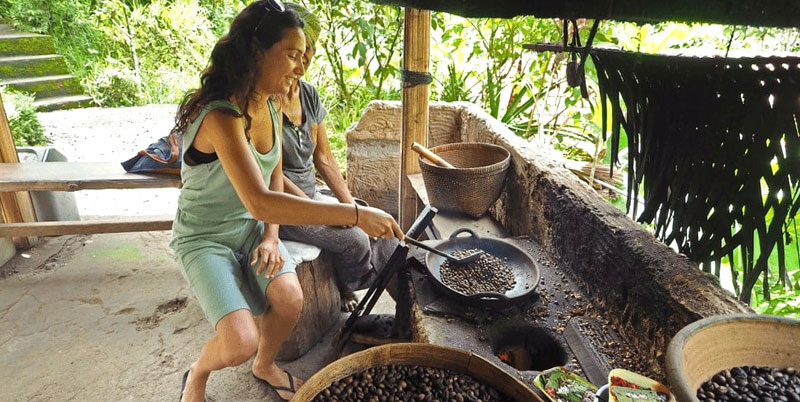Exploring the Abundant Society and Spectacular Landscapes of Agrotourism in Ubud
Ubud, commonly commemorated as the heart of Bali, provides an one-of-a-kind opportunity for those seeking to experience agrotourism that seamlessly mixes social splendor with mind-blowing landscapes. As vacationers browse through Ubud's vivid tapestry of traditions, they are welcomed to reveal the stories behind each social method and landscape function.
Finding Ubud's Cultural Heritage
Nestled in the heart of Bali, Ubud functions as a vivid epicenter for those anxious to explore the island's rich social heritage. Understood for its creative traditions, Ubud is a hub where old techniques meet contemporary expressions, creating an one-of-a-kind tapestry of cultural experiences. Visitors are attracted to its myriad of workshops, galleries, and temples, each using a look right into Bali's creative and historic tradition.
Central to Ubud's cultural attraction is the Ubud Royal residence, a considerable site that stands as a testimony to the region's royal heritage. The palace regularly organizes typical dance performances, offering an authentic understanding right into Balinese narration with dancing and songs. The streets of Ubud are lined with galleries showcasing jobs of both popular Balinese artists and emerging abilities, mirroring the island's dynamic art scene.

Immersive Agricultural Knowledge

Additionally, Ubud's agrotourism initiatives typically include workshops on lasting farming methods. These workshops emphasize the value of organic farming, permaculture, and biodiversity preservation, typically under the advice of educated experts. They function as an academic platform for visitors, cultivating a deeper admiration for the complexities of lasting agriculture.
Additionally, site visitors can check out coffee and chocolate ranches, where they find out about the processes of cultivation and production. Guided trips supply comprehensive descriptions of each action, from bean to cup or cacao hull to chocolate bar, improving the total understanding of these considerable agricultural items.
These immersive experiences not just enrich site visitors' understanding of Ubud's farming heritage however likewise advertise lasting tourist practices, guaranteeing the preservation of these cultural landscapes for future generations.
Picturesque Rice Terraces and Landscapes
Structure on the immersive farming experiences, site visitors are attracted to the fascinating breathtaking rice balconies and landscapes that define Ubud's countryside. The renowned Tegalalang Rice Terraces are specifically distinguished, supplying an elegant display screen of Balinese ingenuity in farming. These terraces are not just useful however likewise act as a testament to the unified relationship between the Balinese people and their setting. The subak watering system, a UNESCO-recognized social heritage, showcases a lasting and old method of water administration that continues to sustain regional farming.
As site visitors traverse the winding paths through the terraces, they are met with scenic views that extend across green areas, punctuated by swaying coconut hands and the far-off shape of Mount Agung. The landscape gives a calm backdrop that welcomes reflection and appreciation of nature's charm (Agrotourism in Ubud). For those interested in photography, the ever-changing light and shadows cast by the daybreak or sunset supply many possibilities for capturing stunning pictures
Beyond the terraces, Ubud's rolling hillsides and lavish plant life produce a varied tapestry that beckons exploration. Treking tracks meander via these landscapes, allowing visitors to get in touch with the land and experience the relaxing rhythm of rural life.
Farm-to-Table Culinary Delights
In the middle of the natural elegance of Ubud's landscapes, the farm-to-table motion uses a genuine cooking experience that connects site visitors with the area's farming heritage. This strategy celebrates the cooperative connection between the land and its produce, with neighborhood ranches providing fresh, organic components to Ubud's innovative cooks. Site visitors are invited to take part in a gastronomic trip where the origins of each component are transparently showcased.
In Ubud, farm-to-table dining transcends simple usage; it comes to be an instructional experience. Restaurants frequently supply directed excursions of the ranches supplying their kitchens, enabling restaurants to witness lasting farming techniques firsthand. This connection fosters a deeper recognition for the thorough treatment that enters into cultivating the plants and increasing animals.
The cooking offerings mirror the rich variety of Ubud's agricultural landscape, featuring recipes that highlight seasonal fruit and vegetables and typical Balinese tastes. From vibrant salads teeming with exotic eco-friendlies to aromatic curries infused with fresh natural herbs, each plate is a testimony to the region's plentiful harvests.
Furthermore, the farm-to-table ethos sustains local farmers and areas, ensuring that agricultural practices are preserved while advertising financial sustainability. This activity underscores a commitment to high quality, sustainability, and the party of click here now Ubud's special terroir.
Involving With Regional Artisans
Many site visitors locate themselves captivated by the elaborate craftsmanship of Ubud's neighborhood craftsmens, whose job shows the region's abundant social heritage. These artisans, often masters of their craft, contribute considerably to Ubud's dynamic social landscape. From typical batik textiles to carefully sculpted wood artifacts, each piece informs a story linked with generations of proficiency and custom.
Engaging with these artisans gives an unique chance to delve much deeper into Balinese society. Numerous workshops use hands-on experiences, where travelers can discover methods passed down via centuries. These interactive sessions not only foster gratitude for the craftsmens' skills yet likewise provide a significant link to the region's background and traditions.
Visitors can discover craftsmen villages such as Mas, renowned for its great wood carvings, or Celuk, famous for splendid silver jewelry. Right here, one can witness the dedication and accuracy called for to produce each masterpiece. Purchasing straight from these artisans guarantees that the profits support neighborhood areas and sustain typical methods.
In Ubud, engaging with local craftsmens is not just a traveler activity; it is an enriching cultural exchange that enhances the agrotourism experience, leaving visitors with a much deeper understanding and recognition of Bali's creative heritage. - Agrotourism in Ubud
Final Thought
The expedition of Ubud's agrotourism offers an extensive recognition for Balinese social heritage and all-natural elegance. Jointly, these aspects promote a deeper understanding and gratitude of Ubud's sustaining social and natural attraction.
Central to Ubud's social allure is the Ubud Royal residence, a substantial landmark that stands as a testimony to the area's imperial heritage.Ubud provides a myriad of immersive agricultural experiences that permit site visitors to engage deeply with the island's click site agrarian way of life.Structure on the immersive agricultural experiences, site visitors are drawn to the captivating beautiful rice balconies and landscapes that define Ubud's countryside.Amidst the all-natural elegance of Ubud's landscapes, the farm-to-table movement supplies a genuine culinary experience that connects site visitors with the region's agricultural heritage.Many site visitors discover themselves mesmerized by the elaborate workmanship of Ubud's local artisans, whose work why not find out more shows the region's abundant social heritage.
 Mara Wilson Then & Now!
Mara Wilson Then & Now! Taran Noah Smith Then & Now!
Taran Noah Smith Then & Now! Jason J. Richter Then & Now!
Jason J. Richter Then & Now! Alexa Vega Then & Now!
Alexa Vega Then & Now! Megyn Kelly Then & Now!
Megyn Kelly Then & Now!